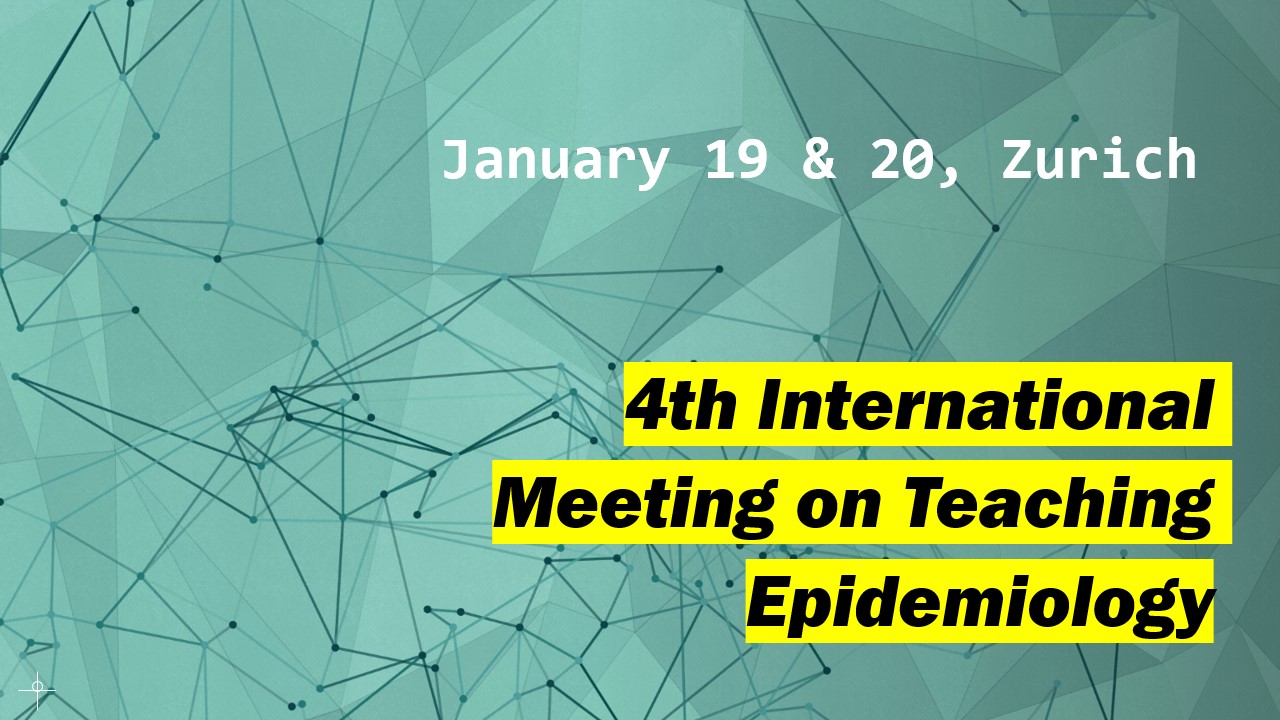4th International Meeting on Teaching Epidemiology

19 – 20 January, 2026 in Zurich, Switzerland
Innovative Approaches to Teaching Epidemiology - A Lived Experience
Teaching epidemiology in academic settings often follows a traditional, lecture-based approach. While foundational, such methods risk disconnecting students from the real-world complexities of epidemiological work. Furthermore, lecturers need to be aware and respond to rapid developments in generative AI, which are seeping into research and teaching.
Three offered teaching workshops at the EpiTeaching Meeting challenge that norm by introducing innovative, experiential course modules that translate core epidemiological concepts into hands-on, practice-oriented and participatory learning. These modules go beyond theory, focusing on problem-solving, role-play, case-based simulations, and instructor guided exploration of AI tools.
Meeting attendees will not simply observe – they will experience the teaching methods as learners. Through structured interaction and reflection, participants will gain insight into novel and innovative teaching formats and leave equipped with inspiration, ideas and material for their own teaching contexts.
Workshop 1: Teaching Epidemiology When GenAI Is in the Room
With Laura Rosella and Viktor von Wyl
Generative Artificial Intelligence (GenAI) is becoming part of research and teaching - whether we like it or not. Students (and researchers) are also increasingly adopting GenAI for analytic tasks [https://www.nature.com/articles/d41586-025-03046-z]. As Epidemiologists, we have a strong tradition and clear vision of how sound studies and data analyses need to be conducted in order to generate evidence of high quality. At the same time, GenAI can make complex analytic steps look effortless, sometimes masking critical judgment.
This conundrum challenges established notions of how we teach and conduct epidemiological research. As researchers, how should we adapt so that we may leverage the benefits of AI whilst maintaining analytical rigor? Building on their own experiences [https://tinyurl.com/dhzf424f], members of the #SOLIDERA team will let you explore the challenges and opportunities of GenAI-based epidemiological analyses. In this 2-hour hands-on workshop we will analyse a de-identified health dataset to compare GenAI-assisted and conventional statistical workflows in epidemiology. We will reflect on the pitfalls, but also on responsible use, so that teachers and students are better qualified to apply and teach GenAI responsiblyin Epidemiology.
Workshop 2: Embracing a Creative Classroom: Active Learning and Critical Thinking
With Dannon Cox and Alison Abraham
In an era where passive learning no longer meets the demands of public health education, this two-hour interactive workshop invites educators to reimagine their classrooms as spaces of creativity, engagement, and critical inquiry. Grounded in evidence-based pedagogy, participants will explore hands-on strategies that foster active learning and sharpen critical thinking that promote core competencies in epidemiology.
Through a series of immersive activities and reflective inquiry, attendees will experience how backward design, scaffolding, and creative assessment can transform traditional lessons into dynamic learning experiences. Whether you're teaching foundational concepts or advanced analytic skills, this session offers adaptable tools to meet diverse learner needs.
Participants will leave with a toolkit of “grab-and-go” lesson ideas, innovative assessment techniques, and practical strategies to elevate student engagement and deepen learning. Join us to rethink how we teach epidemiology and walk away ready to inspire the next generation of critical, creative thinkers.
Workshop 3: Learning by Doing: A Full-Day Simulation of Epidemiology in Action
With Thomas Radtke, Alessia Raineri and Milo Puhan
There is abundant evidence that active learning is more effective than passive learning for acquiring competencies. This is why we moved away from "teaching epi" by the means of lectures and exercises to "coaching" students. Using randomised trials as use cases to acquire core competencies of epidemiologists we let students develop the study question, design and conduct a study and finally write up and present the results, all in a psychologically safe environment.
In this full day activity, participants experience our course in groups of up to 10. Using two topics we have selected as examples, they will first define the research question, define the role of each course participant (e.g., obtaining informed consent, applying the (control) intervention, masked outcome assessor, or being the principal investigator) and work out all key elements of a study (e.g., eligibility criteria, means to minimize biases, SOPs for intervention). The Epiteaching Meeting participants will then conduct the study whereby other meeting participants serve as study subjects.
Participants of the Epiteaching Meeting will learn about the roles of students, teaching assistants and faculty and get familiar with the documentation and guidance for this course, that is based on group-based active learning and evidence-based coaching to acquire core competencies in epidemiology.
After registration, participants will be contacted to indicate their preferences regarding workshop attendance, as there will not be enough space and time for everyone to complete all 3 workshops. Participants will be required to select either Workshops 1 & 2 or Workshop 3.
IMPORTANT INFO:
The 4th International Meeting on Teaching Epidemiology is hosted by the Epidemiology, Biostatistics and Prevention Institute (EBPI) of the University of Zurich.
Attendance is restricted to 100 participants, and the organizers strive for broad diversity in terms career stage (academic epidemiologists, advanced PhD students and PostDocs), teaching experience, geography and subfields of epidemiology.
Organizing committee
- Viktor von Wyl (University of Zurich)
- Iris van Rooij (Radboud University Medical Center)
- Femmie de Vegt (Radboud University Medical Center)
- Ali Abraham (Johns Hopkins University)
- Thomas Radtke (University of Zurich)
- Gerben ter Riet (University of Amsterdam)
- Milo Puhan (University of Zurich)
Contact information
Antonia Banti, E-Mail
Doreen Gille, E-Mail